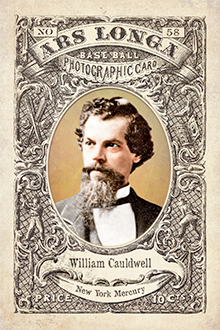
- Series: Pioneer Portraits I: 1850-1874
- City: New York
William Pierce Cauldwell (1824-1907) was, per the New York Tribune’s obituary, “the father of Sunday journalism.” More significantly for baseball, Cauldwell was the first publisher to dedicate regular space and ink to the game of baseball as news (starting in 1853), while also serving as mentor to the “Father of Baseball,” Henry Chadwick, whom he hired in 1858 to report on the new “national pastime” - a phrase Cauldwell’s Sunday Mercury newspaper coined on December 5, 1856.
Cauldwell had begun as a typesetter in 1841 before becoming publisher of the Sunday Mercury in NYC. In 1853 he began covering the games between the Knickerbockers and Gothams, introducing a wide audience to this phenomenon of outdoor athletics. He charted its course, reporting on the exponential growth of clubs all over the country. In his summary of the game in 1860, Cauldwell’s column no longer was long enough to list all the teams. He noted that California had seen its first game played on Feb 22 of that year.
- Cauldwell was active in politics, serving in the NY Senate and State Assembly as well as being a Supervisor of The Bronx before its annexation into NY City
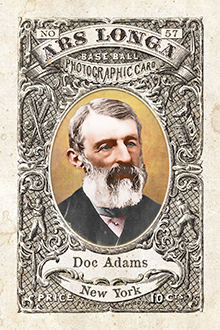
- Series: Pioneer Portraits I: 1850-1874
- City: New York
- Team: Knickerbockers
Daniel Lucius Adams (1814-1899) was playing baseball before the game was well organized or codified. He and other young doctors in New York simply found the game a great outdoor exercise. He was part of the New York Base Ball Club by 1840, five years before joining the Knickerbockers, considered by many to be the developers of the game we know today. Whatever he called it, Doc would go on to write the book on the national pastime, literally. Adams was a perennial leader among the founding fathers of the day. He advocated or arbitrated the evolving rules that came to shape the game: nine players, nine innings, ninety feet between the bases (forever to be the gold standard of human perfection). Historian John Thorn has decreed Doc as “first among the Fathers of Baseball.” The list of credentials supporting that title are too numerous to detail here. The origins of the American Game have always been curiously shrouded. The luminaries who invented the game were largely anonymous for decades. Once the Abner Doubleday myth was finally punctured, it has remained for modern historians to fill the gaps and Doc Adams has rightly assumed a prominent place in the pantheon.
- Credited with creating the shortstop position, first as a relay man when the flimsy balls made outfield throws difficult, then as a key spot in the infield defense
- In 2016, Adams' 1857 “Laws of Baseball” brought the phenomenal sum of $3.26 million at auction amid a trove of documents from that era
- Doc Adams was SABR’s Overlooked 19th Century Baseball Legend for 2014
- Doc Adams’ candidacy for election to the National Baseball Hall of Fame was finally put to vote when he appeared on the Pre-Integration Era Committee Ballot for 2016. Needing 12 of the 16 committee members’ votes for election, Doc unfortunately fell two votes short.
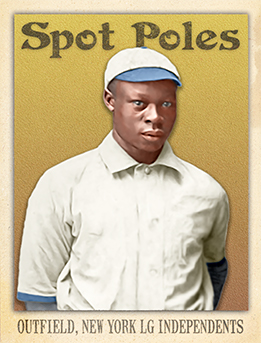
- Series: Diamond Heads '15
- City: New York
- Team: Lincoln Giants
- League: Independent
Spottswood Poles (1889-1962) was ranked by renowned athlete and singer Paul Robeson as one of the four most talented black athletes of the first half of the 20th century, along with Jesse Owens, Joe Louis and Jack Johnson. Fast company for a fleet-footed outfielder who was once timed in a sub-ten-second 100 yard dash. Spot was raised in Harrisburg, PA and came up with the sports clubs for colored kids. His talent led him to debut with Sol White's Philadelphia Giants in 1909. He was a hit. And could he hit: averaging well over .400 for four seasons. He followed his mentor to New York's Lincoln Giants and remained with various NY clubs until returning to Philly and Ed Bolden's Hilldale Club. Some highlights of his time with the Lincolns included defeating Rube Foster's powerhouse Chicago American Giants and proving his mettle against all competition, including getting three straight hits off Grover Cleveland Alexander in one of the exhibition games played against major league teams. Spot enlisted with the 369th Infantry Regiment, dubbed by their German foes the Hellfighter Regiment for their implacable defense (never giving up a trench or a yard of battlefield), and earned five battle stars and a Purple Heart. The 369th was the first African American unit in WWI and was assigned to the French forces who knew them as “The Men of Bronze”. They called themselves the Harlem Hellfighters. After the war, Poles knocked around before settling back with Hilldale.
- Playing in Cuban and Negro ball, Poles is cited in some sources as averaging over .400 lifetime, a stat not corroborated by Baseball Encyclopedia. Suffice to say, he was one of the best hitters of his or any era
- John McGraw pegged Spot as one of four black players he'd have put in the majors, with Pop Lloyd, Smokey Joe Williams and Cannonball Dick Redding
- The decorated war hero is buried in Arlington National Cemetery with his wife Bertha
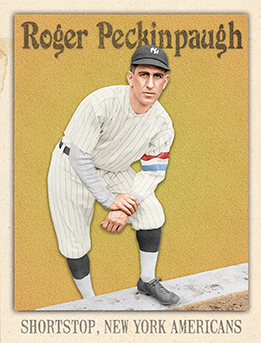
- Series: Diamond Heads '15
- City: New York
- Team: Yankees
- League: American League
Roger Thorpe Peckinpaugh (1891-1977) caught the eye of Nap Lajoie who signed the 19-year old to a pro contract in 1911 with Cleveland. The Naps quickly regretted sending the budding star to the Yankees in 1913, where Roger immediately impressed with his defensive skills at short (best arm of his era) and leadership qualities. Frank Chance made him captain the following year and, upon Chance’s resignation late in the season, Peckinpaugh became the youngest manager in MLB history. NY hired another to manage in ‘15, but Roger would remain captain his entire tenure with the Yankees, which culminated in a World Series appearance in 1921. That proved a fateful Fall Classic for the veteran shortstop. He set a record with nine assists in one game, but his failure to corral a first-inning grounder in the deciding game allowed the only run to score. Peckinpaugh would be traded to Boston that offseason. Far from through, Roger would win a Series with the Senators in ‘24 and then play the goat once more as Washington dropped the 1925 Series. He was honored that year as the first SS named MVP. The League Awards had replaced the Chalmers Award in 1922.
- Became Cleveland’s manager in 1927, returned in ‘41 and later stepped up to GM
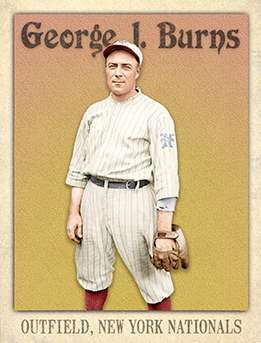
- Series: Diamond Heads '15
- City: New York
- Team: Giants
- League: National League
George Joseph Burns (1889-1966) was dubbed by his teammates “Silent George” for his reserved, soft-spoken manner. He might as well have been named “Anonymous George” as one of the greatest outfielders of his generation of whom few remember today. He retired holding records for leading the National League in runs scored five times, a Giants' club single-season record for steals (62) that still stands, and top-ten ranking in games played and games in the outfield in MLB. The Utica native debuted with McGraw's crew in 1911 and George quickly found a home in left at the Polo Grounds, mastering its odd angles and even conquering the dazzling afternoon glares, prompting scribes to dub the area Burnsville. He was one of the first to don sunglasses and his mates later described him as “the 'greatest sun fielder' in the history of the game.” Only Rogers Hornsby exceeded George's total bases in 1917 and it wasn't till Willie Mays 53 years later in 1972 that his career stolen base record for the Giants would be eclipsed. His last hurrah in NY was the 1921 Series. The team hadn't won in October since 1905 and George hadn't performed well in his previous attempts at post-season glory. But '21 proved triumphant for Burns and his team as they beat the Yankees in the first Series between teams sharing the same home field. Babe Ruth had been phenomenal in the regular season but was hurt during the post-season and George got to wear the laurel wreath.
- A renowned amateur boxer and wrestler, the diminutive Burns never backed down from invitations to grapple with his much more physically formidable teammate Jim Thorpe
- Growing up in his father's pool hall, Burns was a world-class pool player, but teammates wouldn't play with him unless he agreed to play left-handed
- McGraw traded Burns to the Reds two months after the '21 World Series for Heinie Groh, but the speedy Burns wasn't through. He set an NL record with his 28th steal of home in 1922
- In fifteen ML seasons, Burns' 2,077 hits produced a .287 career average and only Musial and Hornsby equaled his feat of leading the NL five-times in runs record




